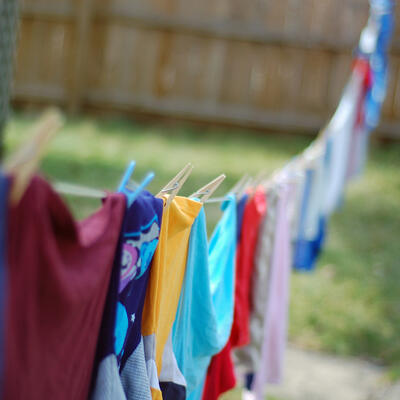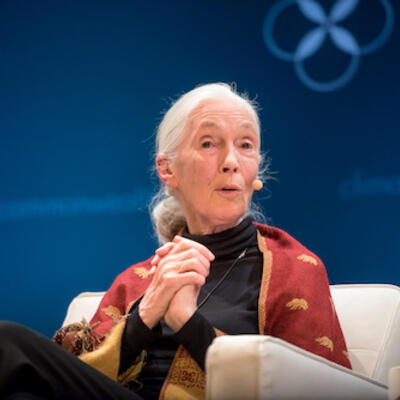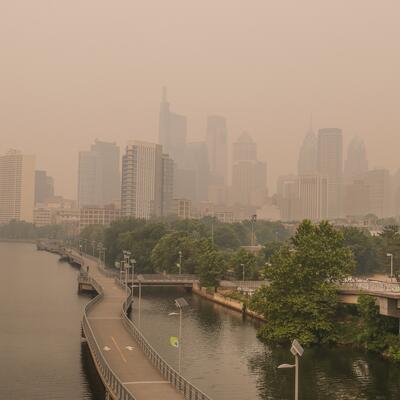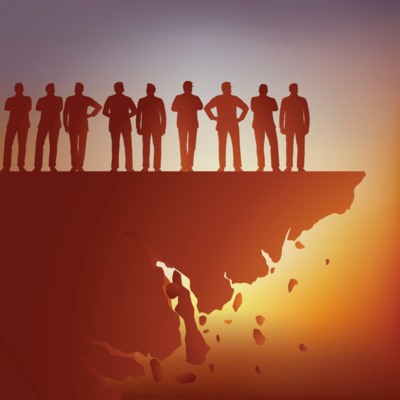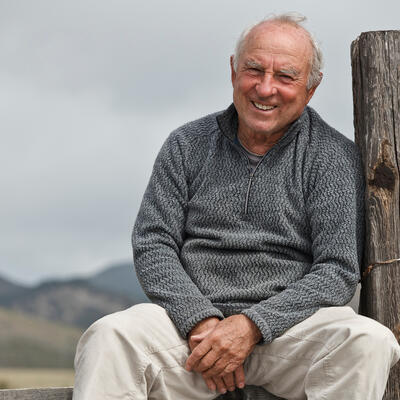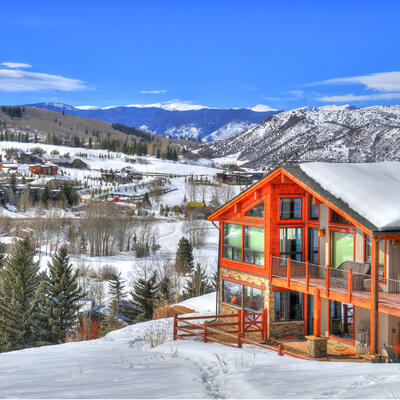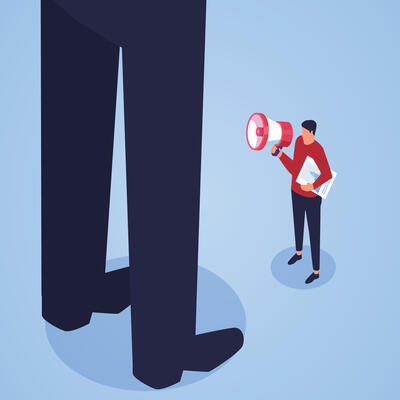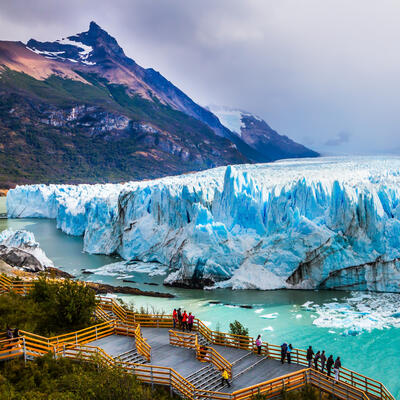
Climbing, Conservation and Capitalism
Guests
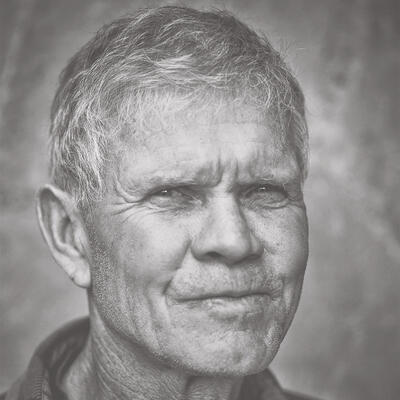
Rick Ridgeway
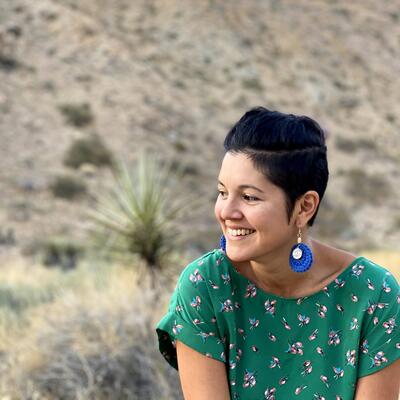
Amanda Machado
Summary
The outdoor clothing and gear company Patagonia is known for its commitment to sustainability and environmental health, but its prices often make it synonymous with elite access to nature and adventure sports. Founder Yvon Chouinard began as a scrappy rock climber intent on finding and making climbing equipment and high-functioning outdoor clothing. Today the company is one of the leading U.S. outdoor retailers with annual sales more than $1 billion.
Rick Ridgeway is former vice president of public engagement at Patagonia, and was behind the infamous “Don’t Buy This Jacket” ad campaign, which advocated for sustainability yet paradoxically increased sales. He’s recognized as one of the world's foremost mountaineers, along with Chouinard and The North Face co-founder Doug Tomkins. Ridgeway says he and Chouinard struggled with making consumer goods and their interest in conservation.
“It was a real dilemma. Trying to figure out whether we were part of the problem or part of the solution because we are making a lot of stuff.” Take the infamous jacket, for example.
“No matter how hard we had tried to make that jacket with no unnecessary harm, it still had used nearly 200 liters of water or gallons to make it. It still left behind 20 pounds of carbon dioxide emissions. It still created two thirds of its own weight in waste,” Ridgeway says. “And we were wrestling with that dilemma at Patagonia trying to figure out, well, should we continue to grow ourselves? Should we try to figure out how to redefine capitalism so that we can have a company that was in stasis, that would still survive without growing?”
One solution they landed on was growing food and fiber through regenerative farming, Ridgeway says. “If we could succeed in making products out of fibers that were creating healthy soil then we’re drawing carbon out of the air and putting it in the ground.”
The image of wealthy white people engaging in risky and costly outdoor adventures is often driven by the outdoor industry itself through narratives and advertisements.
“One of the biggest scams that the outdoor industry has perpetuated is this idea that the outdoors is expensive when it is quite literally the freest thing we have, it’s everywhere,” says writer and social justice facilitator Amanda Machado. “But we've commercialized that, and we’ve turned it into a commodity. We've turned it into something where you have to buy gear and know the right gear in order to feel like you can access it.”
Machado recalls going on her first backpacking trip and having no idea where to buy all the gear on the list.
“My mom took me to an army surplus store because that was the only place we knew that had wool socks and water resistant pants. I'd never heard of REI. I didn't know what L.L. Bean was,” she says. That can create barriers for people of color like her to access the outdoors, Machado says.
“If you can't see yourself in those spaces then it’s hard to feel invited or welcome in that movement. And I think the other part that we really need to address is that there is a long history of trauma and oppression that connect the outdoors to people of color. We see this with Black folks on slavery, Indigenous folks in colonization.” She says the legacy of racist or oppressive histories across the U.S. still play out today.
Machado wrote an essay in Sierra magazine called “Why People of Color Often Feel Unsafe in the Outdoors,” partly to respond to the skepticism she often faced during social justice workshops with outdoor companies when she raised safety as a core issue.
“It was so obvious to my personal experience. We would always have talks before going, like, is this a safe place to go? Will there be other people of color there? Will there be cell phone reception?” Machado says. “These are not conversations I ever had when I went camping with white folks.”
Related Links:
Don’t Buy This Jacket
Why People of Color Feel Unsafe in the Outdoors
Full Transcript
Greg Dalton: This is Climate One. I’m Greg Dalton. Many companies are increasingly focusing on a lower carbon footprint.
Rick Ridgeway: No matter how hard we had tried to make that jacket with no unnecessary harm, it still left behind 20 pounds of carbon dioxide emissions. It still created two-thirds of its own weight in waste.
Greg Dalton: Should we trust corporations to decarbonize the economy?
Rick Ridgeway: If you can create food and fiber with regenerative farming, then that creates healthy soils which pull carbon out of the air and store it back in the ground.
Greg Dalton: And how can the outdoor industry help make nature more safe, accessible and welcoming for all?
Amanda Machado: You know if you can't see yourself in those spaces then it’s hard to feel invited or welcome in that movement. And I think the other part that we really need to address is that there is a long history of trauma and oppression that connects the outdoors to people of color.
Greg Dalton: Conservation and capitalism in the great outdoors. Up next on Climate One.
Greg Dalton: What’s the role of corporations, particularly the outdoor industry, in conserving natural lands? This is Climate One. I’m Greg Dalton. As I record this, the international climate summit known as COP26 is just wrapping up. On next week’s show, we’ll take a deep dive into what the nations of the world achieved – and didn’t achieve – in Glasgow. But now, for an exploration of whose voices get heard in the rooms where it happens, we turn to Climate One Senior Producer Brad Marshland, who has been on the ground in Scotland.
[nat sounds of protest]
Brad Marshland: I’m in the middle of an estimated 50 thousand people marching from Kelvingrove Park to Glasgow Green. It’s a designated route well away from the negotiation halls.
Victoria Stanford: My sign says “Don’t wait until it’s too late.” Our message essentially is for everyone, because it’s everyone’s fight, but it’s also for the British government and global governments, and thirdly, it’s to COP.
Brad Marshland: That’s Victoria Stanford, a doctor in the UK.
Victoria Stanford: Health needs to be in the center, in the very core of every decision that we make, because ultimately, the climate crisis is a health crisis, and we as doctors are gonna be dealing with the consequences.
Brad Marshland: COP26 is a four-ring circus, only the rings are more like concentric circles. The outer ring holds protests like these. One ring in is “the Green Zone” at the Glasgow Science Centre, with educational events open to the public. Across the River Clyde is the more restricted, main event in The “Blue Zone.”
Brad Marshland: Access to the Blue Zone is limited to accredited government officials and organizations – meaning only 40,000 people from all over the world. It feels like a trade show, only instead of companies overtly flogging their wares, it’s nations touting their achievements and NGOs working to gain support for their causes. Karen Florini is VP of Programs for the independent research organization Climate Central.
Karen Florini: We wanted to be in this location to help spread the word, to help share the information about what it is we’ve got, for free for them to use – science-based imagery and science-based maps.
Brad Marshland: And within this Blue zone, there’s an even more secure area where the actual negotiations take place. It doesn’t have a name like the Green Zone or Blue Zone. Maybe it’s the Ultraviolet Zone, which most people can’t see. For Antwi-Boasiako Amoah, lead negotiator for the Ghana delegation, there are some key messages getting through to that inner sanctum:
Antwi-Boasiako Amoah: One on loss and damage; one on reliable, predictable finance, and one also on adaptation action on the ground.
Brad Marshland: But are those messages being taken seriously by those in the global north?
Antwi-Boasiako Amoah: That’s a good question. Sometimes the body language and then also the obvious tactics of these developed country parties make it very clear that they are not ready. They keep on shifting the goalposts.
Brad Marshland: In his opening address of this year’s COP, UN Secretary-General António Guterres said that everyone already knows what needs to be done. So what’s the point of all the shouting outside and the polished presentations inside the Blue Zone? Karen Florini, who also served as Deputy Special Envoy for Climate Change in the Obama Administration, says the problem is the pace:
Karen Florini: We know what needs to be done. We’re just not doing it fast enough. The external protestors and the people in the Blue Zone, the advocacy groups and the companies in the Blue Zone who are saying “go faster and here’s how to go faster” – that’s very important because it needs to translate into a faster pace. We are seeing a lot of pledges but not much progress.
Brad Marshland: Meanwhile, those on the outside wonder if their voices are still not loud enough – or important enough – to move those on the inside to turn their pledges into action – before it’s too late. For Climate One, I’m Brad Marshland in Glasgow.
Greg Dalton: The outdoor clothing and gear company Patagonia is known for its commitment to sustainability and environmental health, but its prices often make it synonymous with elite access to nature and adventure sports. Founder Yvon Chouinard began as a scrappy rock climber intent on making climbing equipment and high-functioning outdoor clothing. Today the company is one of the leading U.S. outdoor retailers with annual sales more than $1 billion dollars. Rick Ridgeway is former vice president of public engagement at Patagonia. He’s recognized as one of the world's foremost mountaineers, along with Yvon Chouinard and The North Face co-founder Doug Tomkins. His new memoir, Life Lived Wild: Adventures at the Edge of the Map, chronicles decades of his adventures. Ridgeway says for him, the appeal of the great outdoors started at a young age.
Rick Ridgeway: One of the earliest influences for me was when I was 14 years old and got a copy of the National Geographic in the mailbox with the article about first American ascent of Mount Everest. And in it was a picture of Jim Whittaker, the first American to climb Everest, standing on the summit, holding his ice ax up with hurricane winds blowing the American and National Geographic flags tied to the ax handle. And I saw that and it just connected with me and I said I want to be that guy.
Greg Dalton: And early in the book you relayed a conversation you had with Nima Norbu, one of your guides on the American Bicentennial Everest expedition. He says that if Sherpas could make the same money some other way they wouldn't go on these dangerous trips, especially if they could be home with wives and children. He goes on to say that Sherpas think Americans on this expedition a kind of silly “maybe you people have too much money and you don’t know how to spend it.” So, how do you think about that in terms and did you think about privilege back in those days?
Rick Ridgeway: I did. And that story is the first chapter of the book. After I saw that article in National Geographic, I try to teach myself how to climb that set off the warning buzzer in my mother's maternal instincts and she sent me to Outward Bound schools a high school graduation president, and I was hooked. So, I started going on mountaineering trips and eventually even in my mid-20s that led to an invitation to join the second American attempt on Mount Everest following the first ascent in the National Geographic article that had inspired me to start. So, there I was in my mid-20s on the highest mountain in the world and I was convinced I was gonna make it to the top. I just wanted it so bad. And then at about the 26,000-foot level I got sick and I got infection in my lungs and that was it. I was knocked down and I didn't make the top but my climbing partner did. And I had to reconcile that I had to figure out you had to look inside why I was so disappointed. And it was a mirror looking back at myself I can see the answer to the question was, I was disappointed because it was Everest and it was all about my ego and not about what I could spiritually get out of an experience like that. And that became a considerable introspection and that's why I chose to open the book that way. I thought it was a good way to really challenge this idea that most people have about mountaineers, you know, they probably think it's all about reaching the top. But what I learned over my lifetime is that's not the real goal.
Greg Dalton: It’s a privilege to risk your life for pleasure for some people anyways and you also say that in mountaineering and in business it’s not about taking risks, but managing risk. Say more about that.
Rick Ridgeway: Well, my experiences as a mountaineer have taught me a lot of things that I have taken from the high altitudes back down to my life at sea level. And part of that life is my business life with other colleagues and business mentors, people like Yvon Chouinard and Doug Tompkins who have been my climbing partners. And I worked at Patagonia for 15 years with Yvon. And one of the key insights was understanding really how to manage risk. You don't want it really take a risk on a climb that is going to kill you. And in business you don’t want to take risk that are going to possibly jeopardize the health of the business. But I think the biggest lesson taken from the mountains back to the way we ran the businesses was what I just told you about the process. About finally learning that it's not about the summit but it's the footsteps to get there. And you can apply that to business too and that you can find the real meaning out of the process of running the business instead of some in game of just trying to create wealth for you and especially if it's just your shareholders instead of your stakeholders.
Greg Dalton: Yvon Chouinard and Doug Tompkins became your mentors as you became this accidental businessman. You’re all skeptical of business and capitalism, why did you continue building a company that was selling consumer goods, and how did you reconcile that with your interest in conservation?
Rick Ridgeway: It was a real dilemma. Trying to figure out whether we were part of the problem or part of the solution because we are making a lot of stuff. And we realized right in the beginning that no matter how hard you work to reduce the impact of the stuff you're making it still has a really measurable impact. And wrestling with that was the reason we ran that now famous ad back in 2011 on Black Friday the kickoff to the shopping frenzy of the Christmas season in the New York Times with a photograph of one of our best-selling jackets and above at the headline “don’t buy this jacket” because we wanted to shock people to go into the copy of that ad in where we explain that no matter how hard we had tried to make that jacket with no unnecessary harm, it still had used nearly 200 liters of water or gallons to make it. It still left behind 20 pounds of carbon dioxide emissions. It still created two thirds of its own weight in waste. And we were wrestling with that dilemma at Patagonia trying to figure out, well, should we continue to grow ourselves? Should we try to figure out how to redefine capitalism so that we can have a company that was in stasis that would still survive without growing. And finally, we realized that there was an answer in the emerging science of food and fiber production around using regenerative protocols. So, here's the connection. If you can create food and fiber with regenerative farming, then that creates healthy soils which pull carbon out of the air and store it back in the ground. And that was an enormous aha force because if we could succeed in making products out of fibers that we’re creating healthy soil that we’re drawing carbon out of the air and put it in the ground. Then that shirt that you're wearing right now could actually represent carbon atoms that have been sequestered back in the ground. So, maybe making consumer goods making more stuff could be done with more good than harm.
Greg Dalton: So, a net positive. And we’ve heard some companies recently say this because there’s typically companies say we want to be less bad, less bad. And so, this is flipping that and going further and say we want to be net positive social and environmental benefit as a company rather than just minimizing harm. Do you think the company overall achieved that?
Rick Ridgeway: Well, it's a work in progress. We’re supporting smallholder farmers in India to try to develop the protocols for growing cotton regeneratively so that the cotton will produce healthy soils as sequestered carbon. And we're sourcing our wool from ranches that follow the same regenerative protocols and are also creating soil health. So, it’s a step-by-step process and we’ve got into the food business now at Patagonia too for the same reason. That it is an enormous potential solution to climate change, partial solution.
Greg Dalton: Right. And a vehicle for good. And yet the irony is that don't buy this jacket campaign increased sales of the jacket.
Rick Ridgeway: Yeah, I know. Ad week came out with a little notice after the ad came out and they said the coolest, most ingenious use of reverse psychology we’ve ever seen in advertising. And they actually thought that's what we were doing. Could you imagine they were they just assumed by default, that we were cynical? I never got over that actually.
Greg Dalton: Yeah, it’s a privately-owned corporation, you know, Patagonia led by the Chouinard family has in your words the luxury to do whatever we want and that means not being beholden to shareholders. So, your thoughts there on whether that's good that you don’t have that shareholder pressure, but these days a lot of shareholders are pressing companies to be more sustainable.
Rick Ridgeway: Yeah, therein lies an enormous hope for us. That could be the biggest driver to really change business much more potentially than just the influence of a company like Patagonia.
Greg Dalton: We’re talking about conservation, capitalism and the outdoor industry. Our Climate One podcasts typically contain extra content beyond what’s heard on the radio. If you missed a previous episode, or want to hear more of our empowering conversations, subscribe to our podcast wherever you get your pods. Coming up, protecting more of our land and waters can help slow the advance of extreme weather events.
Rick Ridgeway: But if we’re gonna get there we’re gonna have to have a lot more people in love with nature, advocating for the protection of nature and pressuring their representatives and politicians to create more protected areas. (:13)
Greg Dalton: That’s up next, when Climate One continues.
Greg Dalton: This is Climate One. I’m Greg Dalton, and we’re talking with Rick Ridgeway, one of the world's foremost mountaineers. He’s the former vice president of public engagement at Patagonia, and his new memoir is Life Lived Wild: Adventures at the Edge of the Map. Based on his identity as a mountaineer, I asked Rick what’s been the impact on him of seeing receding glaciers and snowpack due to climate disruption.Let’s get back to my conversation with Rick Ridgeway, one of the world's foremost mountaineers and former vice president of public engagement at Patagonia.
Rick Ridgeway: In the beginning of my book I say that I calculate I spent over five years living in tents. And most of that was tents pitched in really remote wild areas really deep into nature where I learned over the years and decades to pay attention to nature, to really observe shifts and changes. And as a consequence of that I was able to see firsthand the retreat of glaciers to the shift in the patterns of migrating birds. I've actually been able to witness it to witness the changes which used to be measured in geologic time happening in human time. And that is astounding to consider that. One of the expeditions I was fortunate to participate in was a traverse of Antarctica on dog sleds. And it started on the Antarctic Peninsula on a feature called the Larsen Ice Shelf where for a couple weeks we dug in the Antarctic winter down this ice shelf. And I remember one night in the tent hearing the ice crack and I was used to that because I slept on glaciers where ice is cracking all the time but this was a different kind of crack. This was really shallow and sharp. And a few years later sitting back at home here in California looking at the newspaper I saw this article about an iceberg the size of the state of Rhode Island breaking off the Larsen Ice Shelf right where I had been and floating out to sea.
Greg Dalton: I’m getting shivers because I think that is my earliest climate conscious moment. I vividly remember seeing Larsen, I think the Shelf B, you know, Larsen Shelf and a little thumbnail photo of The New York Times before I founded Climate One and saying oh that can't be good. In 2015, you were kayaking in Southern Chile with Yvon Chouinard and North Face founder Doug Tompkins. High waves capsized both of your kayaks plunging you into 40° water. What happened next?
Rick Ridgeway: Doug and I were in a double and two others were in a double and then there was a couple of, Yvon and another in single kayaks. And we were going along the remote coastline of an enormous lake in Southern Chile called General Carrera. And the water was extremely cold but the conditions were near perfect for the first two days. And then on the third day wind blew up and we took the day off and the next morning it seemed calm, but we launched our boats and we headed across the bay towards a point when the wind picked up again very strongly. And this time it was crosswise to our direction. And Doug and I had been having problems with the rudder in our boat malfunctioning and we were having increasing difficulties keeping the kayak pointed down the waves instead of counter to the waves and then we had this crosswind. Well, the others got ahead of us because we’re falling behind and then the boat turned partly sideways on a wave that tipped us and we capsized into this really cold water and we both knew we were in big trouble. And we tried to right the boat several times and get back in it and paddle, but we kept getting capsized and then we tried to swim towards the point and I thought I was dead. The water was actually 39° and you can’t last very long in water that cold. So, second time in my life where the first time was in an avalanche where I had the seconds and minutes to really consider my life and what I thought was probably my imminent death. But our friends did reappear and started towing us towards the shoreline and I was unconscious by the time they got me ashore. And it took them a little longer to get Doug ashore and by that time he was dead. He didn’t make it.
Greg Dalton: And we all know on some level that we’re going to die. And we spent a lot of time pushing that fact aside. And you talk about how Western culture hasn't always been that way and that how looking at death you’ve had a couple of real close encounters with it can change our relationship with nature.
Rick Ridgeway: Yeah. In that avalanche that I was in with Yvon and two other close friends in a remote part of Tibet. One of my closest friends died in my arms and we buried him on the side of the mountain. And we were that avalanche for a full minute and in for a full minute I thought I was dead. And then I had years later this similar second experience with Doug's death similar in that I also at the same time assumed I was gonna die. So, I went through that a couple times. And then just two years ago my wife of nearly 40 years, died from cancer. And from those experiences, but also rooted in this life outdoors close to nature I have been able to get in to my bones and internalize the knowledge the deep knowledge that all life is framed by death. And life doesn't exist without death.
Greg Dalton: The Buddhist impermanence of things.
Rick Ridgeway: It is a Buddhist way of looking at it, it is. And I credit the time I spent outside in nature with that realization in a deep way to integrate it inside of me. I think for me anyway, probably more than I ever could have done meditating in a monastery where I have been a Buddhist, but it's worked for me. And what I've learned from that which I think has given me resilience to deal with the death of my friends and my wife most recently is this commitment to not turn your back on the pain of losing somebody you love and that you're close to or maybe even possibly losing your own life, but to confront it to acknowledge it every day to let it in instead of trying to keep it out. And it’s the opposite of this American idea of closure which I don't believe as a very, very healthy response to death but rather we should all in my opinion be doing the opposite of that. And even in nature we are all, all of us all humans all animal life is designed to do everything we can to avoid death. But watching death in nature is a way to understand its integrated part of our lives.
Greg Dalton: One of Doug Tompkins legacies is the conservation organization Tompkins Conservation a private nonprofit organization. He founded it with his wife Kristine Tompkins the first CEO of Patagonia. The group has preserved more than 14 million acres in Chile and Argentina through an approach known as rewilding. Some indigenous observers say that rewilding is aligned with indigenous principles, but the movement has historically been nonindigenous that unintentionally marginalizes indigenous voices. Do you think that's a fair critique of rewilding?
Rick Ridgeway: It bears up but like most critiques like that there's a lot more nuance. First, by the way, Kris has had another conservation victory couple weeks ago so the total acreage is getting close to 18 million acres.
Greg Dalton: Oh, that’s a lot.
Rick Ridgeway: That’s a huge amount. But you know this theme of indigenous cultures as stewards of nature is a topic that I do address in my book. And that to me is a topic that is very, very nuanced, but I am firmly of the belief that the protection of natural areas in the world in the main is better done in the hands of indigenous people than it is with Western cultures. And as a partial solution to climate change, the conservation of nature is an essential pillar in the basket of solutions that all of us need to address to keep the planet to 1.5° because keeping areas natural of course allows them to operate naturally. And part of that operation is carbon sequestration as you know and most of your listeners do. So, I work with groups I’m working with one organization called One Earth right now which is really advocating the scaling of protected areas as a climate change solution and is advocating for the management of those protected areas to be in the main, under the guidance of indigenous peoples that live there.
Greg Dalton: So, that 18 million acres that was bought by rich people from the Global North is that turned over to an indigenous stewardship?
Rick Ridgeway: Part of it, yes. Most of those areas in the very southern part of South America the indigenous people have been extirpated from most of those lands. But there is one big park, the biggest of all of them that Doug Tompkins created Kawesqar down in the very southern part of Chile and just north of the Strait of Magellan that is going it will be managed by the indigenous people in that area.
Greg Dalton: You expressed admiration for E.O. Wilson's concept of half earth setting aside half of the planet for nature. Does that mean keeping people out?
Rick Ridgeway: No. It has in the past but that was the Western concept of protected areas. It came out of mostly the way the British set up national parks in the early part of the 20th century right through the middle. But it’s an unsustainable strategy; it just doesn't work long-term. And a far better solution is to create protected areas as I said under the management of indigenous people when they are committed to managing those lands in a long-term balance with wildlife.
Greg Dalton: Patagonia mobilized against the Trump administration's efforts to shrink Bears Ears National Monument in Utah. Both with a lawsuit and a PR campaign that replaced its usual homepage with a black screen and a text that read “The President stole your land.” The idea of stolen land is fraught given how a lot of national parks are based on stolen land. So, what’s the outcome of that and did Patagonia collaborate with indigenous people in that Bears Ears campaign?
Rick Ridgeway: Yes, with several tribes actually at the table with them and the NGOs that were working with them on that. And, you know, Greg, you said earlier in our conversation that you quoted Yvon as saying, we’re a private company and that means we get to do what we want and that's a good example of doing what you want is a publicly traded company could probably not get away with going out on a political limb like we did with that one.
Greg Dalton: There is something of a paradox inherent in the outdoor industry itself and how do you resolve the tension between encouraging people to get outdoors so they have a stake in wanting to protect wilderness and that lead to potentially trampling it, you know, the national parks have seen during COVID have seen almost an overwhelming number of people which are straining the parks yet is that a good thing bad thing how do you see that?
Rick Ridgeway: Well, we need more parks. That would be the solution I would advocate and we don't need to have less people going to fewer parks we need just the opposite. Because it is that time in nature that teaches us so much that can enrich our lives. It's not just a place of solace, but it’s certainly that but it's a place where we can learn in a deep way, how we humans are part of nature. How we fit into the web of life and we can fall in love with nature and only when you fall in love with nature, you’re gonna be really committed to saving nature. So, if we want to really get to where half of the earth is protected which we've actually validated with the best science done before up to now is going to be a super important goal to keep the earth to 1.5° but if we’re gonna get there we’re gonna have to have a lot more people in love with nature advocating for the protection of nature and pressuring their representatives and politicians to create more protected areas; that's the solution; it's not in restricting access, but rather doing just the opposite.
Greg Dalton: And looking at extinction resource constraints climate change the root cause is too many people buying too much stuff. So, how do we get at that?
Rick Ridgeway: Yeah. And that's the problem. It is too many people but the real problem is to me people using too much stuff. And that circle, see how that links right back to the wrestling match we had in Patagonia about whether we’re gonna continue to grow the origins of that ad don't buy this jacket. And there was an accompanying essay in our catalog that year that I wrote called the elephant in the room and it was about this very topic that we’re talking about right now and trying to challenge all of us to think about it because it's really a direct challenge to capitalism as is. Like you can’t have an economic system based on annual compounded growth without eventually getting to the cliff and going over it just won't work long term.
Greg Dalton: We’re trapped in this growth paradigm because companies are judged by that compounded quarterly annual growth and yet when that growth stops the economy collapses people lose their jobs. People are hurt and yet we’re trapped.
Rick Ridgeway: And nobody knows how to get out of the trap yet. Doug Tompkins referred to it as a predicament rather than a crisis because he said crises rally people to find solutions and predicaments are a little more difficult and this is our greatest predicament.
Greg Dalton: Companies are tripping all over themselves declaring goals of net zero carbon emissions. Some people look at the absence of strong policy, look to companies to carry the ball forward on climate. Should we trust corporations to be part of climate solutions?
Rick Ridgeway: Well, we should all be, being dubious is a good position being skeptical but not cynical. But skepticism is good when you're trying to parse whether any company's claims to sustainability are legitimate or not, but increasingly they really are. And it’s because the individuals running these big companies really are starting to understand the threat of climate change to their businesses and it’s even going deeper than that. I, in my position at Patagonia had the good fortune to meet many of these people CEOs running the biggest companies in the world. And sometimes I get to go out camping with them around the fire where you know their corporate speak fades away and you really learn what they're about. And what I learned with many of these people is that the big change comes at home. And the big change for so many of them is at the dinner table when their kids look at them and say what are you doing about this dad or mom? And it was fascinating to hear so many of these high-level executives reference that as one of the drivers for their own commitments. But what is important in my comment here, Greg, is that these commitments from them are serious and they really so many of them are really concerned about this. But then they are limited in their own actions just by the structures of capitalism that we've been talking about by the responsibilities, fiduciary responsibilities they have managing their companies for their shareholders. So, you know, when I think about this as you start to think about it more deeply then you start to realize that it’s truly up to us it’s up to us who are the people buying all the stuff or using the services that these companies make that we’re really the driver’s seat on this. Because the more we demand from those companies of reductions in environmental impact and increases in social justice, the more they’re gonna have the freedom to do what so many already want to do now. Because if they don't, they're going to be irresponsible to their duty of fiduciary responsibility to the company because they’re gonna start losing sales.
Greg Dalton: Rick Ridgeway is former vice president of public engagement at Patagonia. This is Climate One. Coming up, considerations for people of color preparing for a trip into nature.
Amanda Machado: Is this a safe place to go? Will there be other people of color there? Will there be cell phone reception? If one of us feels unsafe, what’s like a signal we can make to someone else to leave that situation or to know that we have to get back in the car and we’re gonna go somewhere else.
Greg Dalton: That’s up next, when Climate One continues.
Greg Dalton: This is Climate One. I’m Greg Dalton. We’re talking about access and equity for people in nature and the role of capitalism in the outdoors industry. Amanda Machado is a writer and facilitator whose work explores how race, gender and identity affect the way we experience the outdoors. She spoke with Climate One’s Ariana Brocious.
Ariana Brocious: As in so many realms, white people are usually the center of outdoor adventure imagery in narratives. Why do you think that is?
Amanda Machado: Well, I think the short answer is white supremacy. White folks control 98% of land in the USA they own 98% of land in the US they control 80% of the wealth. They’re over 90% of the CEOs of companies that are in the outdoor industry and the environmentalism movement as well. So, when you have white dominance to that extent, then it makes sense that that's the narrative that is centered in what we hear about the outdoors what we hear about the environmentalism movement and what we think of as an outdoorsy person or what an environmentalist looks like. So, to me I think that's where I become really passionate about the work I do of forcing those organizations in that industry to start confronting white supremacy in a way that I don't think they wanted for a really long time. You know, a lot of times what I get the impression of when I do work with these organizations is that there is a way that we can kind of avoid that subject, but to me, I feel like we cannot really hold ourselves accountable to the outdoors and to the environment unless we’re addressing that first it kind of becomes the core of all the other issues that we’re dealing with.
Ariana Brocious: So, how do those kinds of imagery and narratives then discourage people of color from taking part in wilderness activities?
Amanda Machado: Well, I think what I've noticed is that you know if you can't see yourself in those spaces then it’s hard to feel invited or welcome in that movement. And I think the other part that we really need to address is that there is a long history of trauma and oppression that connect the outdoors to people of color. We see this with black folks on slavery, indigenous folks in colonization. As a Latinx person I think a lot about how growing up from farming and being in touch with land and being outside was associated with migrant work and that was the kind of work that was the stereotype of the Latinx community that a lot of folks are trying to get themselves out of and show that we were educated and outside of that kind of realm of labor. So, when we have those associations in our history and in our ancestry, then it's hard to unpack all that and then reconnect with the outdoors in a way that doesn't feel oppressive and in a way that actually feels liberating. And, you know, couple that with how the history of that still lingers in outdoor spaces to this day I mean what I think about a lot is Oregon is what was the only state that explicitly excluded black folks from entering the state of Oregon when it was founded in its constitution that was it was a white supremacy state. Colorado had Ku Klux Klan members all throughout its government, when it was first founded. The highest hate crimes are still often in places that are outdoorsy, right, Idaho, Montana, Wyoming have some of the highest rates of hate crimes for queer folks or people of color in the United States. So, when you think about that long history, the fact that public pools, public beaches, public parks are all segregated into the Civil Rights Act it becomes even more clear that you know people of color were just never welcome in these spaces that trauma still exists. And unless we confront it, I think it's really hard to reengage with the outdoors in a way that feels healthy. I know for me when I grew up, I grew up in Florida and it was just pretty much standard that anytime I went to a park or an outdoor space there were Confederate flags all along the highway and all along the houses leading up to that space. So, to me that was just always part of the deal. I kind of accepted that to be outdoors and to share my love of the outdoors that other folks meant I had to access some of the most racist places in the United States, but I think that's a hard bargain to make and a hard bargain to ask folks of color to make. And I think that's what we’re grappling with right now.
Ariana Brocious: You wrote a piece in Sierra magazine titled why people of color often feel unsafe in the outdoors. What motivated you to write that article?
Amanda Machado: Yeah, well, I had done a lot of workshops with outdoor companies at this point and you know I’d always talked about how the safety issue really is one of the core issues as to why folks of color were still not accessing outdoor spaces as easily as others. And every time I would mention this, I got the impression that people thought I was exaggerating, right, like there was a lot of responses like really in 2020 people still feel unsafe like a lot of skepticism. And then over last summer, you know, when Ahmaud Arbery was shot while going for a run there were dozens of other reports of folks that were going camping videos online that I saw of someone who is threatened to be lynched while they were trying to camp at a lake. Suddenly it became really clear and obvious through social media what was actually happening right and that this was not an exaggeration at all. That this was something that is literally still happening every day. And at the time I was dating a person of color. I was friends with most the people of color that I would go camping with. And so, for me it was so obvious to my personal experience, we would always have talks before going like is this a safe place to go. And on the scale of 0 to 10 we’re like what is the POC safety rating here. Will there be other people of color there? Will there be cell phone reception? If one of us feels unsafe what’s like a signal we can make to someone else to leave that situation or to know that we have to get back in the car and we’re gonna go somewhere else. Do we carry a gun do we carry, what do we carry to like feel safe in these places? Well, other people have guns in these places. These are all conversations that were pretty natural to me and to my friend group and my social circle. And I was noticing that for white folks it really wasn't visible to them. You know, these are not conversations I ever had when I went camping with white folks. And I think it wasn't obvious that these were the things that folks of color were doing when we were outside. So, it was really important for me to share that and to really kind of validate that for folks of color that are feeling this that this wasn't something that they’re being dramatic about you know this is something that all of us are dealing with and have to make an active decision to combat every day if we’re gonna live a life that includes outdoor adventure, right.
Ariana Brocious: Right. I mean you’re touching on just another aspect of the sort of white supremacy the privilege really of not having to worry in the same way about some of these things that is like the experience the lived experience of people of color. You’ve written about how outdoor hubs cities like Estes Park, Colorado, Bend, Oregon and Jackson Hole, Wyoming are overwhelmingly white. And yet, the workers who keep those towns running are often people of color who may not be able to afford the kind of gear that you need to go skiing for example, even though the mountains are right in their backyard. So, how much of this that we’re discussing is really rooted in economics which of course is in our nation tied very closely to race.
Amanda Machado: Yeah, I mean I think one of the kind of biggest scams that the outdoor industry has perpetuated is this idea that the outdoors is expensive when it is quite literally the freest thing we have, right, it’s everywhere. We have access to it outside of our windows and in our backyards and literally it’s all around us. But we've commercialized that, right, and we’ve turned it into a commodity. We've turned it into something where you have to buy gear and know the right gear in order to feel like you can access it. We’ve turned it into a sport or into a competition and that kind of that element or that relationship to nature makes it incredibly difficult then for folks who have a different relationship to nature to feel like they are welcome. You know, I know when I first started backpacking and I saw the gears list I had no idea where to buy all that stuff. I remember my mom took me to an army surplus store because that was the only place we knew that had wool socks and like water resistant pants. I've never heard of REI. I didn't know what L.L. Bean was. I didn’t own a rain jacket. I didn't know what Goretex was. So, all of those things I think can create a lot of barriers for folks to enter into those spaces. And I think in my work, what I try to do is reconnect folks to the idea that the outdoors can be something that is accessible, and especially for folks of color something that’s always been accessible to us, you know, like I think of my ancestry my dad is from Ecuador. And when I traveled and started hiking there seeing folks hiking in the Andes barefoot or with sandals and using trails in the Andes were used to just go from town to town or to deliver goods or to trade it wasn't a hobby it was just, you know, a way of being and a way of living and interacting with the earth. And, you know, for me to grow up thinking that hiking was a white people thing when I had a dad who is literally raised in the Andes and to have an ancestry of ancestors that were, you know, connected to the Andes feels kind of ridiculous when I start to think about it in that way, right.
Ariana Brocious: And it even influences of course the whole food industry as well. I mean you think about the granola bars and the often expensive and complicated foods that are prepared for going outside when really you can just eat, you know, you can take apples and bananas and sandwiches hiking as well.
Amanda Machado: Yeah, no, I didn’t know what trail mix was either until I was 19 and went on my first backpacking trip. And, you know, now I have done a lot of hiking trips with Latino Outdoors and what I love about Latino Outdoors is almost every time I go with them, they have Mexican food, conchas for breakfast. They have carne asada tacos for dinner. And right, like you can make that stuff outside it's not actually all that difficult. It's more of again what is the cultural narrative about what counts as outdoor culture and what doesn't.
Ariana Brocious: Well, you've written about your personal upbringing and this pressure that you felt or this sort of cultural expectations to be clean and pretty. Can you tell us a bit about how you experience that and maybe how that at times conflicted with your experience as an outdoors woman?
Amanda Machado: Yeah, well, I think you know growing up my role models for Latinx femininity were like Jennifer Lopez and like Sophia Vergara from Modern Family. So, it was this very high femme representation of what femininity could be for Latinx women, and it was this idea that you know we were always very well put together and had all our makeup and did our hair and, you know, just very presentable. And I think growing up as a Latinx person in the US too, you know, I was raised on respectability politics. I also think I thought I had to earn the respect of white folks and those in power by looking presentable and looking professional and making sure I never looked dirty or unclean, or any of the other things that were like stereotypically assigned to people from my culture. So, I think that really put myself at odds with outdoor culture where you know that's part of the deal, right. You’re always getting dirty, wearing flannel, wearing rags wearing used stuff, not really thinking about your presentation. So, I think in some ways, you know now identify as a queer person and I think when I think back on me getting into the outdoors when I was 19 I think in some ways it was a space where I could access, you know, like a queering of gender and a queering of like my presentation in ways that I didn't really feel comfortable or safe enough to access in the real world or outside of the trail. The other thing I think about is that you know I think in Latinx culture there's also this idea that women are supposed to be the ones taken care of, you know, that we’re like kind of inherently delicate or something fragile that we look for men or masculinity to take care of us. And I think the outdoors is kind of a way for me to also access my own self-reliance. You know when you're backpacking, I'm literally carrying my own weight, right, I am taking care of myself entirely. The outdoors is also a space where I was able to access my own bravery and see that as something that I could expect of myself.
Ariana Brocious: Right. Yeah, I think it’s empowering for a lot of people, women, especially. In an essay for Vox you wrote, “Whenever I tell my parents about a backpacking trip in the wilderness. My parents joked about the irony. As immigrants they had worked all their lives to ensure I had a roof over my head, and presentable clothes to wear. And now I was intentionally choosing to sleep outside wearing clothes covered in dirt.” I found that really a great summary perhaps of some of these cultural expectations we’ve been discussing. So, what is your family think now about your adventure habits?
Amanda Machado: Oh, I think they’ve gotten used to it. I think it’s taken time but I think they’ve gotten used to it. I think building my work professionally around it has helped to make them realize that this isn't just a silly hobby but now has become something that is like so core to who I am and what I want to do with the rest of my life. When I lived in Cape Town a few years ago I took my dad hiking to the top of Table Mountain, and that was the first time he had ever summited any mountain, it was a thousand meters up. And, you know, on the top of that mountain I remember him telling me, you know, like it is really interesting that I'm from the Andes and this is the first time I’m doing this. So, I think it's slowly starting to creep in, you know, this idea that we were always people of the mountains and we’re always people that could connect outside and really starting to question our own severement from that you know and how colonization and white supremacy and all these different systems have kind of created that in our ancestry and how we can move away from that.
Ariana Brocious: Amanda Machado is a writer and facilitator, whose work explores how race, gender and identity affect the way we experience the outdoors. Amanda, you facilitate anti-oppression workshops for companies like Patagonia and The North Face. So, how receptive are the people in these corporations when you go in and lead these workshops are they aware of these issues before you arrive, have they given it thought, is it new information to them?
Amanda Machado: I think that varies. I think unfortunately sometimes I’m only called in when something has gone terribly wrong, right. Someone has been called out on social media or an employee has resigned or there's a boycott going on something like that. Other times, I think, especially after the summer it wasn't even something so direct, it was just that folks finally woke up, you know, and saw that this was something that they couldn't ignore anymore. So, I do see a lot of good intentions. I do see a lot of willingness to learn and a curiosity. I think again what is hard is acknowledging that even with great intentions, we can have a negative impact that something that I think is very difficult for organizations to own up to what is the negative impact we are having even with all of our good intentions. And then I think even harder is the question of like what risks am I willing to take and what am I willing to sacrifice and give up in order to achieve justice. And again, I think that sometimes is a really uncomfortable question for them to sit with because it often means giving up money and giving up power and giving up being in charge and those are things that are really, really hard I think in corporate social responsibility industries in areas for folks to actually to get to that point. I think that's kind of the last stage and unfortunately that's the stage that we need people and that’s the stage of the transformation actually happens. But I think getting folks there when they call me in, I'm not sure that that's where they're ready to be in yet.
Ariana Brocious: For a white outdoors person who's maybe hearing this information and contemplating some of these issues in a new way, what advice would you have for them to make the experience of being outdoors more welcoming, more equitable, more comfortable and safe for other people?
Amanda Machado: Yeah, I think about a graphic that I use in a lot of my workshops. I don't know if you’ve seen it. It's a graphic that is kind of gone viral online at this point, but there's like a fence and people are trying to look over the fence and there's one person that's tall enough already to see over the fence and that's you know the symbol for the privileged person. And there's the person who can't quite see over the fence yet and then the next graphic shows equity as giving crates or boxes that kind of lift up the person that can't see so they can see over the fence and that's what equity is. But recently I’ve seen a new graphic that now is called liberation and in liberation the fence is taken out entirely, right. So, the argument there is that we don't actually have to give people boxes and crates to help lift them up if we start to tackle the root cause of oppression, right, and the root cause of the inequity. That's when real liberation happens. So, I actually think at this point in my work I try to steer folks away from just thinking of equity, right. We can give folks tools we can give folks resources, access scholarships, all those things are kind of the boxes, right, the crates that we've been giving marginalized folks in order to let them see over the fence. But I guess what I'm most interested now in the outdoor industry and in the environmentalism movement is what is the fence, right. What is the thing that's actually blocking all of us from being able to have climate justice, right, and have a healthy planet? And for me what I think that fence is the way that we’re actually connecting to the outdoors to begin with, right. And the way that we’re actually the narratives as I've been saying you know that we framed around being outside. I think in the US the dominant framing is that we’re conquering nature that it's something that we explore and that we, you know, we summit mountain peaks we have all these documentaries free solo, K2 of us, you know, conquering nature.
We've created this relationship to nature that is conflict right rather than something that can be reciprocal or something that is a relationship right, not something that we are separate from but something that we can reconnect to. So, I actually think the advice that I now give to folks is how can we reorient our own relationships to nature in that way and help perpetuate more stories that tell that as well, rather than the stories we’ve been told about outside in nature beforehand, right. How can we reconnect in that way? I think about Kim Tallbear she's an indigenous activist and writer. And in a podcast recently she was talking about how like in a lot of indigenous, you know, lot of stories that we tell about indigenous movements we talk about their sites in nature as sacred sites and how she actually thinks that sacred is not the right word that it wasn't translated accurately. That for her, the more accurate word to describe the relationship her indigenous community has of nature is relative. So, it's not this place that’s supposed to be pristine and supposed to be like a temple that we like don’t go to and that we have to take, you know, wonderful care of it's actually something that's more like a relationship like a relative like someone we are seeing every day and connecting with every day and communicating with every day and working alongside every day. I don't think that the outdoor industry or even in the environmentalism movement has really told that story or talked about nature in that way. And that to me I think is the fence I think that’s what we need to take down first in order for anything else to work.
Ariana Brocious: Amanda Machado is a writer and facilitator, whose work explores how race, gender and identity affect the way we experience the outdoors. Amanda, thank you so much for joining us on Climate One.
Amanda Machado: Thank you so much for having me.
Greg Dalton: On this Climate One... We’ve been talking about conservation and capitalism in the great outdoors.
Greg Dalton: Climate One’s empowering conversations connect all aspects of the climate emergency. To hear more, subscribe to our podcast on Apple, Spotify or wherever you get your pods. Please help us get people talking more about climate by giving us a rating or review. It really does help advance the climate conversation.
Greg Dalton: Brad Marshland is our senior producer; Ariana Brocious is our producer and audio editor. Our audio engineer is Arnav Gupta. Our team also includes Steve Fox, Kelli Pennington, and Tyler Reed. Gloria Duffy is CEO of The Commonwealth Club of California, the nonprofit and nonpartisan forum where our program originates. I’m Greg Dalton.
